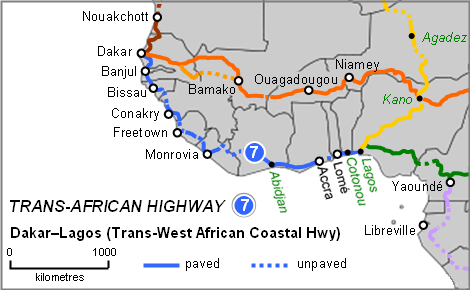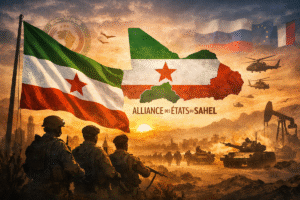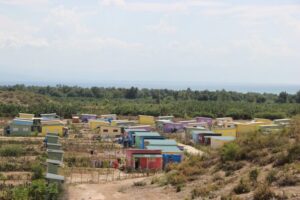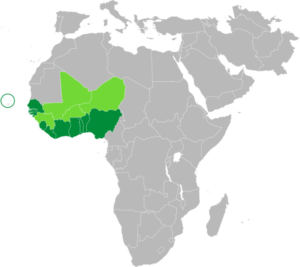- The Trans-West African Superhighway aims to connect five countries to transform transportation and regional integration;
- The project aims to overcome challenges such as overloaded roads and bureaucracy, promoting trade and economic development;
- The construction could strengthen regional cooperation and counter the influence of external powers in West Africa.
Construction of a mega highway may be about to take place in West Africa, where the construction will link five countries and promises to transform the region.
By connecting Lagos, Accra, Abidjan, Dakar and other major cities, the highway will be a hub for economic integration, political stability and, perhaps, a strategic response to the growing impact of external powers.

What is the Trans-West African Coastal Highway?
The new superhighway, called the Trans-West African Coastal Highway, is approximately 4,560 kilometers long and has a budget of 15 billion dollars. It connects five crucial countries in the region — Nigeria, Ghana, Ivory Coast, Senegal and others — and promises to revolutionize the transportation of goods and people.
The expected impact goes beyond improved logistics and cost reduction: it involves greater integration that could redefine the dynamics of power and development in the region.
Existing roads in West Africa, such as the Lagos-Badagry Expressway in Nigeria and the Tema-Aflao Road in Ghana, are often inefficient and overloaded. These routes, which connect major cities and strategic ports, suffer from chronic congestion, poor infrastructure and lack of proper maintenance.
Furthermore, the distance between cities such as Lagos and Abidjan, combined with bureaucratic and slow transport systems, makes economic and social integration difficult.
Therefore, the new Trans-West African project seeks to overcome these limitations by offering a more efficient infrastructure, with improvements in signaling, security and also facilitating the rapid and safer flow of goods and people.
How Can ECOWAS Overcome the Obstacles to Regional Integration?
The creation of the Economic Community of West African States (ECOWAS) in 1975 was an initial attempt to build a framework that would unite the countries of the region around common goals, especially with regard to economic and political integration.
ECOWAS plays a vital role in the search for stability and development, but its effectiveness has been constantly challenged, especially in recent years, with coups d’état and the increasing involvement of external powers, such as Russia, in the political scene of the region.
It is in this scenario of instability that the superhighway appears as a possible light at the end of the tunnel for ECOWAS. Although the organization has often been seen as an analogue of the European Union, its real impact on the daily lives of the region’s citizens has been limited.
The Trans-West African, however, has the power to transform the theory of integration into a more tangible practice, further unifying the region through transport and trade.
The faster movement of goods, people and capital will strengthen the economic interdependence between ECOWAS countries, helping to create a solid foundation for the revitalization of the organization and for facing external pressures.
The impact of this connection will be particularly visible in trade between countries. The reduction of trade barriers and increased efficiency in the transport of goods with less bureaucracy at border crossings will facilitate the movement of essential products, such as food and raw materials, and help to integrate previously fragmented regional markets.
However, the project is not without its challenges. First, ECOWAS must address internal divisions that have intensified in recent years. Coups in countries such as Mali and Burkina Faso have weakened the organization’s cohesion, while nationalist movements and the growing power of external powers such as Russia and China are creating new political tensions.
How Could the Trans-West African Superhighway Transform Regional Economic Development?
The potential impact is not only political, but also economic. An efficient transport infrastructure has the power to transform economies, and the project in West Africa promises to accelerate regional growth.
Countries such as Nigeria, Ghana and Côte d’Ivoire, with relatively strong economies, could see a reduction in transport costs, which could stimulate regional trade and increase competitiveness.
In addition, the construction of the Trans-West African Superhighway could also include improvements in other key sectors, such as energy and telecommunications.
The expansion of electricity networks and increased internet access along the route could provide new business opportunities and improve the quality of life of local populations, which will help to drive social development. A future rail line alongside the highway is also being planned, which will make transport more efficient and sustainable.
This will be particularly important for the poorest countries in the region, which have so far struggled to access markets and essential resources.
With a more conducive environment for trade and investment, the Trans-West African could create a virtuous cycle of growth.
The mobility of people and increased connectivity between local markets could also facilitate the exchange of essential services, such as health and education, something that is crucial to improving living conditions in a region with enormous social challenges.
What is the Impact of External Powers on the Geopolitics of West Africa?
West Africa is a territory of great strategic interest to external powers, particularly China, the European Union, the United States and Russia.
With the growth of trade and the increase in economic relations in the region, the competition for geopolitical influence intensifies.
The construction of the Trans-West African can be seen as a move to strengthen the position of African countries on the global stage, while seeking to attract investments and partnerships that favor local growth.
China, which is already one of Africa’s main trading partners, has invested heavily in infrastructure on the continent. Its Silk Road Initiative, which includes the construction of roads, railways and ports, is directly aligned with Chinese interests in securing access to African markets and natural resources.
Trans-West Africa could also benefit from these investments, but it could also lead to greater economic dependence on China, something that countries in the region should weigh carefully.
On the other hand, Russia has been seeking to expand its influence on the continent. Moscow, with its focus on security and political alliances, could see Trans-West Africa as a way to strengthen ties with countries in the region, but also as an opportunity to challenge the Western presence and the dominance of powers such as the United States and the European Union.
The role of the United States should also not be underestimated. Although its focus on the African continent has been more on security and political stability, the United States has been increasingly interested in economic partnerships, especially in trade and resource exploration. A good example is the recent American investment in the Lobito railway line that will link the interior of southern Africa to the coast of Angola.
The Trans-West African Highway could be another opportunity for the US to strengthen its presence in the region, although trade relations between the two sides need to be on a solid foundation to thrive.
Are Regional Security and Cooperation Key to the Success of the Trans-West African Highway?
One of the biggest challenges to the successful implementation of the superhighway will be ensuring security along its length. West Africa, as mentioned above, faces threats from terrorism and political instability, with insurgent and extremist groups operating in several countries.
This raises the question of how to protect this important infrastructure, which is essential not only for the countries in the region, but also for foreign investors who may contribute to its financing.
Therefore, cooperation between the countries involved will be crucial to mitigate these risks. A coordinated approach to combating terrorism, ensuring border security and protecting citizens is essential.
To achieve this, it is necessary for the nations involved to implement regional security policies that integrate not only military aspects, but also social and economic dimensions.
Trans-West Africa cannot be seen in isolation; it needs to be part of a broader strategy of cooperation in security, development and governance to develop West Africa as a whole in the long term.





[…] Source: atlas-report.com […]